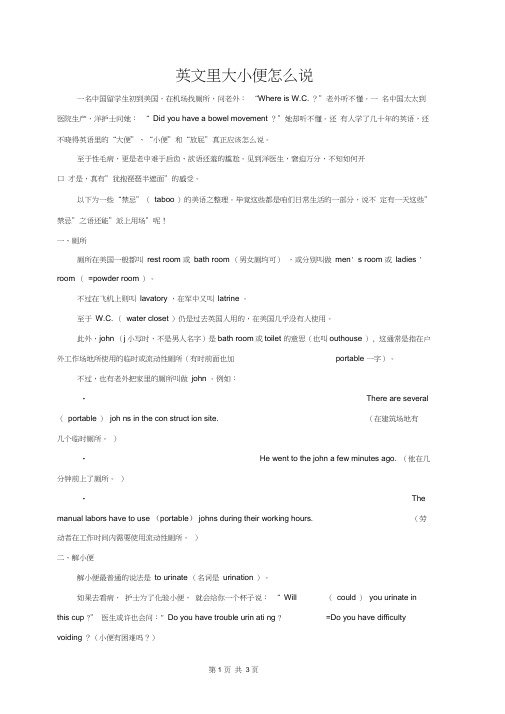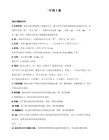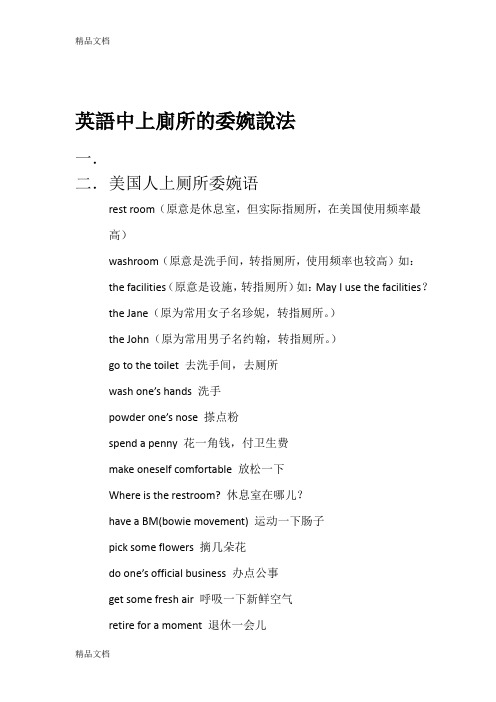英文大小便表示法
学了这么多年英语,你真的会正确的表达“我想尿尿”吗?

学了这么多年英语,你真的会正确的表达“我想尿尿”吗?有很多同学不太确定该如何地道的用英语表达上厕所,小便,尿尿等。
下面这22个和厕所有关的词汇和表达是按照从礼貌到粗俗来排序的。
要特别注意对应场合使用噢,否则可能引起不快。
1.正式,适用于任何场合:Bathroom卫生间I’m gonna [going to] go to the bathroom.例:我要用一下卫生间。
Restroom洗手间Where is the restroom?例:请问洗手间在哪?Little boy’s/girl’s room男/女厕所I’ll be right back, I need to use the little girl’s room.例:我马上就回来,我想去一下洗手间。
Powder my nose去洗手间(注:由女士去卫生间补妆引申而来) Excuse me, I need to powder my nose.例:不好意思,我想去一下卫生间2.熟悉,适合同家人或朋友说:Pee撒尿Where’ the bathroom? I need to pee.例:卫生间在哪儿?我要尿尿。
Tinkle (mostly used by older women)尿尿(一般为较年长的女性使用)I drank too much water! I have to go tinkle.例:我喝了太多水!我要去尿尿。
Go(when used in context) 方便一下(在语境中使用)Where’s the bathroom, I really have to go!例:厕所在哪,我真的要去方便一下了!Potty (Generally used by children) 上厕所(一般儿童使用)Where’s the potty?例(名词):厕所在哪?Mama, I have to potty.例(动词):妈妈:我要上厕所。
Take a 1/2 (number 1 refers to peeing, number 2 to pooping) 大小便(1指的是小便,2指大便)Person 1 – I have to go to the bathroom.例:甲——我要上厕所。
“我要拉屎”礼貌的英语你会说吗?

“我要拉屎”礼貌的英语你会说吗?英语关注微学英语成为“英语自学达人”说起上厕所,是不是只会说toilet或者W.C?然后突然发现,学习英文多年,“我要大便,小便”还真不知道怎么用英语来描述呢?没关系,看完这篇全掌握了。
别忘了底部有测试题哦。
Enjoy your time!上厕所不管你大便还是小便,礼貌的说法通常是直接说你想用一下洗手间、厕所。
而不会说具体内容。
以下为礼貌说法,适用于任何场合。
1.bathroom 洗手间/卫生间Can I use your bathroom?我能借用一下你的卫生间吗?2.restroom 洗手间 /卫生间Is there any restroom around here?请问附近有洗手间吗?3.men’s room&women’s room 男厕女厕Excuse me, where is the women’s room?请问女厕所在哪里?如果在功能性或者熟人之间,表达方式就可以具体一些。
小便urinate 排小便(较正式)1.如果去看病,护士为了化验小便,就会给你一个杯子说:Could you urinate in this cup?使用pee, piss,leak 来表示“撒尿”(熟人间)1.I need to pee/piss badly.我尿急。
2.Stop the car! My bladder is bursting. (超熟)快停车,我的膀胱要炸了(快憋不住了)。
3.Can we stop at the next gas station? I need to take a leak.我们可以在下—个加油站停一下车吗?我要方便一下。
大便1.bowel movement 排便(较正式)Do you have a regular bowel movement every day?你每天排便还正常吗?2.number 2 大号 (稍微委婉)Where’s the bathroom? I need to go number 2厕所在哪里啊?我得上大号了。
英美人如何表达“上厕所”

另外 om,toilet,bathroom,washroom 都可 指盥洗间,也可指厕所。在美国的学校厕所上用 Boys'或 Girls'来表示,公共厕所上多用 Gentlemen's /Gent's 或 Ladies'/Women's。 John 是男子的名字,如果小写成 john 便是指 “厕所”了。Where‘s john?在美国大多是指“厕 所在哪里?”英国人常在口语中用 Loo 表示私人 住宅的厕所。 美国的公厕往往不在路边建筑物内,而是在汽车加 油站。在市内,可以到旅馆、咖啡馆或剧院借用, 公厕一般要收费。
上厕所大便小便英文最经典全面简洁

厕所美国叫:rest room或bath room(男女厕均可)或分别叫做men‘s room 或ladies‘ room(=powder room)飞机叫:lavatory 音标: ['lævətɔri]军中叫:latrine 音标美:[lə'trin]至于W.C.(water closet)仍是过去英国人用的,在美国,几乎没有人使用。
小便最普通的说法是to urinate 音标: ['jʊrənet](名词是urination)此外,还有其他的说法:to piss ;to take a piss;to take a leak;to void;to empty;例如:* I need to piss = I have to take a leak.* How often do you get up at night to void?(晚上起床小便几次?)注意:john(j 小写时,不是男人名字)是bath room 或toilet 的意思(也叫outhouse),这通常是指在户外工作场地所使用的临时或流动性厕所(有时前面也加portable 一字)。
不过也有老外把家里的厕所叫做john。
例如:* There are several (portable)johns in the construction site.(在建筑场地有几个临时厕所。
)* He went to the john a few minutes ago.(他在几分钟前上了厕所。
)* The manual labours have to use (portable) johns during their working hours.(劳动者在工作时间内需要使用流动性厕所。
)注意:小孩多半用to pee 。
例如:* The boy needs to pee.注意:to piss off 是片语,又是指对人生气或对事物的不满。
英语中关于“上厕所”的10个委婉表达

英语中关于“上厕所”的10个委婉表达上厕所来⾃北民⼤英语趣微学 00:00 03:20—— 主播:彭健⼀个外宾想上厕所,便对翻译说:“I wonder if I can go somewhere?”(我可以⽅便⼀下吗?)⽽翻译却把somewhere误解为“某处”,因⽽回答道“Yes, you can go anywhere in China.”(⾏,中国你哪⼉都可以去。
)外宾不禁愕然。
可见,如不了解英语中“厕所”的⼀些表达法是会误事的。
1.Public lavatory意为“公厕”,在公共场所,厕所门上都标有Gent’s(男厕),或Ladies’(⼥厕),有时也标有Men’s, Men’s room, Gentleman’s, Women’s Women’s room.如:Where is the Gent’s?(厕所在哪⼉?)If you would like a wash, the Gentleman’s is just over there.(如果要上厕所,男厕就在那边。
) 2.toilet是最常⽤的⼀个词。
可指“公厕”,也可指“私厕”。
例如:I wonder where the toilet is.(我想知道厕所在哪⼉。
)vatory是个客⽓的词,但不如toilet常⽤。
4.bathroom是书⾯语。
5.loo是⼀个⼝语词,在英国⽤得很普通,主要指私⼈住宅中的厕所。
如:Excuse me, would you like to tell me where the loo is?(请问,厕所在哪⼉?)6.powder room是美语,⼥⼠常⽤。
如:I would like to powder my nose.就表现了美国⼈的幽默。
7.wash roomwashing room, westroom常⽤于美国英语。
8.W.C.是water closet的缩写,常⽤于英国英语,表⽰“有抽⽔没有设备的厕所”,有时也可⽤⼿势表⽰,即拇指和⾷指圈成圆,其他三指向上,模仿成英⽂W和C的形态。
英语中大小便的表达

小便最普通的说法是to urinate(名词是urination),如果去看病,护士为了化验小便,就会给你一个杯子说:「Will (could)you urinate in this cup?」医生或许也会问:「Do you have trouble urinating?」=Do you have difficulty voiding?(小便有困难吗?)此外,还有其他的说法:to piss = to take a piss = to take a leak = to void = to empty。
例如:I need to piss = I have to take a leak.How often do you get up at night to void?(晚上起床小便几次?)此外,john(j 小写时,不是男人名字)是bath room 或toilet 的意思(也叫outhouse),这通常是指在户外工作场地所使用的临时或流动性厕所(有时前面也加portable 一字)。
不过也有老外把家里的厕所叫做john。
例如:There are several (portable)johns in the construction site.(在建筑场地有几个临时厕所。
)He went to the john a few minutes ago.(他在几分钟前上了厕所。
)The manual labours have to use (portable) johns during their working hours.(劳动者在工作时间内需要使用流动性厕所。
)不过,小孩多半用to pee 。
例如:The boy needs to pee.然而,「小便检查」又叫做urine test,因为这里的urine 是化验的样品(specimen)。
例如:Do I need a urine test?注意:to piss off 是片语,又是指对人生气或对事物的不满。
不说 toilet,英文还能咋说“上厕所”

不说 toilet,英文还能咋说“上厕所”?
1. Go to the john
你以为人家要去找约翰?而实际情况却不是你想的那样,John还可以表示“厕所”。
例:Excuse me , I have to go to the john.
不好意思,我得去趟厕所。
2. Pass water
看上去是不是很含蓄?这个词组说的其实就是“小解”。
例:A sensitive bladder can make you feel the need to pass water frequently.
膀胱太敏感胡让人总想上厕所。
3. Number two
英文里“去大号”用了2号代替~~
例:Mom, I gotta do a number two.
妈妈,我要便便!
4. Relieve oneself
Relieve本有“缓解”之意,但也是一种上厕所的委婉表达。
例:I had to relieve myself behind a bush.
我不得不在灌木丛后面解手。
5. Answer the call of nature
这自然本性的呼唤你以为会是啥?其实就是“内急”的逗比说法。
例:He had to leave suddenly to answer the call of nature.
由于内急,他不得不突然离开。
英文里大小便怎么说

英文里大小便怎么说一名中国留学生初到美国,在机场找厕所,问老外:“Where is W.C. ?”老外听不懂。
一名中国太太到医院生产,洋护士问她:“ Did you have a bowel movement ?”她却听不懂。
还有人学了几十年的英语,还不晓得英语里的“大便”、“小便”和“放屁”真正应该怎么说。
至于性毛病,更是老中难于启齿、欲语还羞的尴尬。
见到洋医生,窘迫万分,不知如何开口才是,真有”犹抱琵琶半遮面”的感受。
以下为一些“禁忌”(taboo )的美语之整理。
毕竟这些都是咱们日常生活的一部分,说不定有一天这些”禁忌”之语还能”派上用场”呢!一、厕所厕所在美国一般都叫rest room 或bath room (男女厕均可),或分别叫做men' s room 或ladies ' room (=powder room )。
不过在飞机上则叫lavatory ,在军中又叫latrine 。
至于W.C. (water closet )仍是过去英国人用的,在美国几乎没有人使用。
此外,john (j小写时,不是男人名字)是bath room或toilet 的意思(也叫outhouse ), 这通常是指在户外工作场地所使用的临时或流动性厕所(有时前面也加portable 一字)。
不过,也有老外把家里的厕所叫做john 。
例如:•There are several (portable )joh ns in the con struct ion site. (在建筑场地有几个临时厕所。
)•He went to the john a few minutes ago. (他在几分钟前上了厕所。
)•The manual labors have to use (portable) johns during their working hours. (劳动者在工作时间内需要使用流动性厕所。
)二、解小便解小便最普通的说法是to urinate (名词是urination )。
大小便英语口语

大小便英语口语I need to go to the toilet.我要上厕所。
搭配“go to the toilet”是很常见的说法,意思是“去厕所”。
名次“toilet”的意思是“卫生间”,做复数时指“公共厕所”。
I need to go to the loo.我要去卫生间。
名次“loo”在英式英语里的意思是“toilet”厕所。
所以“go to the loo”和“go to the toilet”的意思相同。
I need to spend a penny.我去方便一下。
搭配“spend a penny”花一便士是“上厕所”的一种委婉表达方法。
过去,英国公测都收费,在入厕前需投入“一便士 a penny”的硬币,才能打开厕所的门。
I need to powder my nose.我要如厕。
这里,“powder one’s nose给鼻子涂粉”原本指“去休息室补妆”,但现代人多用它委婉地表示“去厕所”,听起来更文雅,也就是汉语里常说的“如厕、方便”。
I need to use the restroom.我要用一下洗手间。
除了“toilet”和“loo”以外,“restroom”也可以用来表示“公共卫生间”。
上厕所怎么用英语口语含蓄地说1. I’m going to the loo.无论你是正在开一个会议,或是正在和朋友聚会,只要你想告诉同伴你要离席去一趟卫生间,你都可以用这个表达。
这句话中的 loo 也可以替换成其它表示“卫生间”的单词,比如 toilet 或bathroom。
2. I’m nipping to the loo.To nip 的意思就是“很快地去一个离你所在地不远的地方”。
那么去上厕所就可以说 to nip to the loo,表示“我需要很快地去一下卫生间,马上回来。
”3. I’m popping to the loo.除了 nip 以外,在英国你还可能听到人们用 pop这个词来表示“去某地”。
「尿尿、小便、大便」英文怎么说?秒懂pee、poo、urinate中文意思!

「尿尿、小便、大便」英文怎么说?秒懂pee、poo、urinate中文意思!尿尿、小便、大便英文应该怎么说呢?常见的「尿尿、小便、大便」相关英文说法有pee、urinate、poo…等等。
这三个英文单字是比较常用的,所以一定要学起来唷。
下次当你想要去小便或大便的时候,就不会不知道该用什么英文表达了。
下面整理了「尿尿、小便、大便」的相关英文说法与英文例句,赶快学起来吧!1. pee 尿尿、小便pee的中文意思是指排尿的意思,可以当动词或是名词用,当成名词用,那就是尿的意思,当成动词用,那就是尿尿、小便的意思。
pee相关英文例句:例:I’m going to have a pee. 我要尿尿。
例: Do you need to pee? 你需要撒尿吗?2.poo 屎、大便poo中文意思是指「屎、大便」的意思,可以当成动词或名词用。
poo相关英文例句:例: Have you done a poo, Jenny? 你大完便了吗,珍妮?例: I want to poo! 我要便便!3.urinate 排尿、尿尿、小便urinate中文意思是指排尿、小便的意思,词性为动词。
例: How can you urinate in bed? 你怎么在床上小便?例: Remember to urinate every 3 hours. 记得每三小时小便一次。
pee, pee 中文, pee 中文意思, pee 中文的意思, pee 中文解释, pee 意思, pee 用法, pee 翻译, poo, poo 中文, poo 中文意思, poo 中文的意思, poo 中文解释, poo 意思, poo 用法, poo 翻译, urinate, urinate 中文, urinate 中文意思, urinate 中文的意思, urinate 中文解释, urinate 意思, urinate 用法, urinate 翻译, 大便英文, 大便英文怎么说, 大便的英文, 小便英文, 小便英文怎么说, 小便的英文, 尿尿英文, 尿尿英文怎么说, 尿尿的英文, 英文 pee, 英文 poo, 英文 urinate, 英文大便, 英文小便, 英文尿尿。
大便、小便、放屁

最普通的说法是 to urinate(名词是 urination),如果去看病,护士为了化验小便,就会给你一个杯子说:「Will (could) you urinate in this cup?」医生或许也会问:「Do you have trouble urinating?」=Do you have difficulty voiding?(小便有困难吗?)
He has passed more gas than usual within the last two days.(过去两天中,他放屁比平常多。)
Be careful not to fart in the public.(注意在公共场所不可放屁。)
至于消化不良,大便不通或拉肚子,也有不同的说法。 例如:
He pissed me off. = He made me angry.
He always pisses off (at) the society.(对社会不满)
如果「小便」有毛病,也可以告诉医生说:
My urine is cloudy and it smells strong.(有浊尿,味道很重)
He went to the john a few minutes ago.(他在几分钟前上了厕所。)
The manual labours have to use (portable) johns during their working hours.(劳动者在工作时间内需要使用流动性厕所。)
I have pus (或air)in urine.(尿有泡沫) (pus = cloudy; air = bubble)
I dribble a little urine after I have finished urinating.(小便后还会滴滴答答。)(即失禁毛病)
英语大便小便放屁说法

Oral English 「禁忌」(taboo) 的美语说法厕所在美国一般都叫rest room或bath room(男女厕均可)或分别叫做men‘s room 或ladies‘ room(=powder room),不过在飞机上,则叫lavatory,在军中又叫latrine。
至于W.C.(water closet)仍是过去英国人用的,在美国,几乎没有人使用。
解小便最普通的说法是to urinate(名词是urination),如果去看病,护士为了化验小便,就会给你一个杯子说:Will (could)you urinate in this cup?医生或许也会问:Do you have trouble urinating?=Do you have difficulty voiding?(小便有困难吗?)此外,还有其他的说法:to piss = to take a piss = to take a leak = to void = to empty。
例如:I need to piss = I have to take a leak.How often do you get up at night to void?(晚上起床小便几次?)此外,john(j 小写时,不是男人名字)是bath room 或toilet 的意思(也叫outhouse),这通常是指在户外工作场地所使用的临时或流动性厕所(有时前面也加portable 一字)。
不过也有老外把家里的厕所叫做john。
例如:There are several (portable)johns in the construction site.(在建筑场地有几个临时厕所。
)He went to the john a few minutes ago.(他在几分钟前上了厕所。
)The manual labours have to use (portable) johns during their working hours.(劳动者在工作时间内需要使用流动性厕所。
英语中上厕所的委婉说法

英語中上廁所的委婉說法一.美国人上厕所委婉语rest room(原意是休息室,但实际指厕所,在美国使用频率最高)washroom(原意是洗手间,转指厕所,使用频率也较高)如:the facilities(原意是设施,转指厕所)如:May I use the facilities?the Jane(原为常用女子名珍妮,转指厕所。
)the John(原为常用男子名约翰,转指厕所。
)go to the toilet 去洗手间,去厕所wash one’s hands 洗手powder one’s nose 搽点粉spend a penny 花一角钱,付卫生费make oneself comfortable 放松一下Where is the restroom? 休息室在哪儿?have a BM(bowie movement) 运动一下肠子pick some flowers 摘几朵花do one’s official business 办点公事get some fresh air 呼吸一下新鲜空气retire for a moment 退休一会儿answer the call of nature 去响应大自然的召唤二.西方人关于上厕所的委婉语虽然很多,但是由于使用的对象不同使用的委婉语也不尽相同:男性用语:to rear, go to the gents’,go to the Green man,go to men’s room,Princes(王子) ,Herren(绅士用),spend a penny 花一角钱,付卫生费,have a BM(bowie movement) 运动一下肠子,do one’s official busine ss 办点公事,answer the call of nature 去响应大自然的召唤,retire for a moment 退休一会儿do a job 干个活,,go water the lawn (在草地上浇水),shoot a dog (射击狗),visit the Chamber of Commerce (拜访商工会馆)do one's business(做生意)女性用语:powder her nose, fix one’s face, go to visit ladies’ room, go to no-man’s-land,Princesses(公主),Damen(淑女用),go to the toilet 去洗手间,去厕所wash one’s hands 洗手go somewhere else 去别的地方powder one’s nose 搽点粉pick some flowers 摘几朵花get some fresh air 呼吸一下新鲜空气Where is John? 约翰在哪儿?go and see one’s aunt 去看看姑妈go feed the goldfish (去喂金鱼)go see a dog (去看狗)go see the baby (去看婴儿)see Johnny (去看强尼),drop one's waxsit on the thronerelieve naturerelieve oneself大人用语:go to W.C(water closet),儿童用语:go to the pot,make number one or number two,go to little boys’ or girls’ room,urinate小便pass water;小便make water或empty one's bladder(小便)shake a lily 小便shake the dew off the lily 小便pee-pee(小便)poo-poo(大便)妈妈会对男孩子说:Go make weewee.当然,高雅的妈妈一般不会对孩子说“尿尿”的。
看外国人如何含蓄表达想上厕所

看外国人如何含蓄表达想上厕所有这样一则笑话:一个外宾想上厕所,便对翻译说:“I wonder if I can go somewhere?”(我可以方便一下吗?)而翻译却把somewhere误解为“某处”,因而回答道“Yes, you can go anywhere in China.”(行,中国你哪儿都可以去。
)外宾不禁愕然。
可见,如不了解英语中“厕所”的一些表达法是会误事的。
1.Public lavatory意为“公厕”,在公共场所,厕所门上都标有Gent’s(男厕),或Ladies’(女厕),有时也标有Men’s, Men’s room, Gentleman’s, Women’s Women’s room.如:Where is the Gent’s?(厕所在哪儿?)If you would like a wash, the Gentleman’s is just over there.(如果要上厕所,男厕就在那边。
)2.toilet是最常用的一个词。
可指“公厕”,也可指“私厕”。
例如:I wonder where the toilet is.(我想知道厕所在哪儿。
)vatory是个客气的词,但不如toilet常用。
4.bathroom是书面语。
5.loo是一个口语词,在英国用得很普通,主要指私人住宅中的厕所。
如:Excuse me, would you like to tell me where the loo is?(请问,厕所在哪儿?)6.powder room是美语,女士常用。
如:I would like to powder my nose.就表现了美国人的幽默。
7.wash room, washing room, westroom常用于美国英语。
8.W.C.是water closet的缩写,常用于英国英语,表示“有抽水没有设备的厕所”,有时也可用手势表示,即拇指和食指圈成圆,其他三指向上,模仿成英文W和C的形态。
【英语学习】拉屎用英语怎么说?

【英语学习】拉屎用英语怎么说?你是否常用“I’m going to the toilet”来表达上厕所呢?虽然某些情况下这是对的,但是这种说法有点太过直接,甚至粗鲁了——尤其在美式英语中。
其实你大可不必只使用这一个短语,英文中还有很多用来表达相同意思的语句。
今天,我就教大家英文中所有关于表达“去上厕所”的短语,从最礼貌的方式到最粗鲁、只能同最亲密的朋友说的方式一应俱全。
下面这些表达适用于任何场合:Bathroom卫生间Example: I’m gonna [going to] go to the bathroom。
例:我要用一下卫生间。
Restroom洗手间Example: Where is the restroom?例:请问洗手间在哪?Little boy’s/girl’s room男/女厕所Example: I’ll be right back, I need to use the little girl’s room。
例:我马上就回来,我想去一下洗手间。
Powder my nose去洗手间(注:由女士去卫生间补妆引申而来)Example: Excuse me, I need to powder my nose。
例:不好意思,我想去一下卫生间。
下面这些表达适合同家人或朋友说:Pee撒尿Example: Where’ the bathroom? I need to pee。
例:卫生间在哪儿?我要尿尿。
Tinkle (mostly used by older women)尿尿(一般为较年长的女性使用)Example: I drank too much water! I have to go tinkle。
例:我喝了太多水!我要去尿尿。
Go (when used in context)方便一下(在语境中使用)Example: Where’s the bathroom, I really have to go!例:厕所在哪,我真的要去方便一下了!Potty (Generally used by children)上厕所(一般儿童使用)Example (noun):Where’s the potty?例(名词):厕所在哪?Example (verb): Mama, I have to potty。
最新英语中上厕所的委婉说法

英語中上廁所的委婉說法一.二.美国人上厕所委婉语rest room(原意是休息室,但实际指厕所,在美国使用频率最高)washroom(原意是洗手间,转指厕所,使用频率也较高)如:the facilities(原意是设施,转指厕所)如:May I use the facilities?the Jane(原为常用女子名珍妮,转指厕所。
)the John(原为常用男子名约翰,转指厕所。
)go to the toilet 去洗手间,去厕所wash one’s hands 洗手powder one’s nose 搽点粉spend a penny 花一角钱,付卫生费make oneself comfortable 放松一下Where is the restroom? 休息室在哪儿?have a BM(bowie movement) 运动一下肠子pick some flowers 摘几朵花do one’s official business 办点公事get some fresh air 呼吸一下新鲜空气retire for a moment 退休一会儿answer the call of nature 去响应大自然的召唤三.四.西方人关于上厕所的委婉语虽然很多,但是由于使用的对象不同使用的委婉语也不尽相同:男性用语:to rear, go to the gents’,go to the Green man,go to men’s room,Princes(王子) ,Herren(绅士用),spend a penny 花一角钱,付卫生费,have a BM(bowie movement) 运动一下肠子,do one’s official business 办点公事,answer the call of nature 去响应大自然的召唤,retire for a moment 退休一会儿do a job 干个活,,go water the lawn (在草地上浇水),shoot a dog (射击狗),visit the Chamber of Commerce (拜访商工会馆)do one's business(做生意)女性用语:powder her nose, fix one’s face, go to visit ladies’room, go to no-man’s-land,Princesses(公主),Damen(淑女用),go to the toilet 去洗手间,去厕所wash one’s hands 洗手go somewhere else 去别的地方powder one’s nose 搽点粉pick some flowers 摘几朵花get some fresh air 呼吸一下新鲜空气Where is John? 约翰在哪儿?go and see on e’s aunt 去看看姑妈go feed the goldfish (去喂金鱼)go see a dog (去看狗)go see the baby (去看婴儿)see Johnny (去看强尼),drop one's waxsit on the thronerelieve naturerelieve oneself大人用语:go to W.C(water closet),儿童用语:go to the pot, make number one or number two,go to little boys’ or girls’ room,urinate小便pass water;小便make water或empty one's bladder(小便)do No.2shake a lily 小便shake the dew off the lily 小便pee-pee(小便)poo-poo(大便)妈妈会对男孩子说:Go make weewee.当然,高雅的妈妈一般不会对孩子说“尿尿”的。
你绝对想不到number1和Number2还有这个意思

你绝对想不到number1和Number2还有这个意思首先我们来看一下以下这一则Dad Jokes“I go to toilet for two reasons.我去洗手间有2个原因”“Number 1 and Number 2. 第一和第二”单纯翻译成中文是不是绞尽脑汁都想不明白,去厕所的原因怎么是第一和第二呢?到底这第一和第二指的是什么呢?但如果你是English Native Speaker(英语母语者), 你就会很快恍然大悟, 并且如以下评论般laugh out loud(笑出很大声)究竟这则笑话的笑点在哪里呢?这里就要涉及到美国一个特殊的文化,据说从18世纪开始,美国人就开始把number 1当做“上小便”的一种委婉的书法,Number 2就是“上大便”的一种委婉说法, 这种说法一代一代往下传,所以基本每个美国人都从小受上一辈的影响,会用数字1和数字2隐晦地来说大小便,也就是:Number 1= Pee (小便)Number 2 = Poo (大便)那为什么第一代表小便,第二代表大便呢?以下有几个可能原因和理论依据,1. 来源于课堂“In the 60’s, supposedly children in classrooms had to raise one finger if they had to pee, two fingers if they had to do the doo. Apparently it was to inform the teacher of how long the child was going to be out of class for the bathroom. 在 60 年代,据说教室里的孩子如果要小便必须举起一根手指,如果必须要尿便必须举起两根手指。
显然这是为了通知老师孩子要离开课堂去洗手间多长时间。
2. 父母公众场合的委婉说法Parents just wanted a euphemism for the bodily functions when they spoke to their kids in public. Most parents aren’t going to openly ask their young child, "Do you have to take a dump?" in public-- however, it’s acceptable to ask the kid if they have to "go number 2."当父母在公共场合与孩子交谈时,他们只是想委婉地表达身体机能。
- 1、下载文档前请自行甄别文档内容的完整性,平台不提供额外的编辑、内容补充、找答案等附加服务。
- 2、"仅部分预览"的文档,不可在线预览部分如存在完整性等问题,可反馈申请退款(可完整预览的文档不适用该条件!)。
- 3、如文档侵犯您的权益,请联系客服反馈,我们会尽快为您处理(人工客服工作时间:9:00-18:30)。
以下为一些「禁忌」(taboo)的美语之整理。
厕所
在美国一般都叫rest room或bath room(男女厕均可)或分别叫做men‘s room 或ladies‘ room(=powder room),不过在飞机上,则叫lavatory,在军中又叫latrine。
至于W.C.(water closet)仍是过去英国人用的,在美国,几乎没有人使用。
解小便
最普通的说法是to urinate(名词是urination),如果去看病,护士为了化验小便,就会给你一个杯子说:「Will (could)you urinate in this cup?」医生或许也会问:「Do you have trouble urinating?」=Do you have difficulty voiding?(小便有困难吗?)
此外,还有其他的说法:to piss = to take a piss = to take a leak = to void = to empty。
例如:
* I need to piss = I have to take a leak.
* How often do you get up at night to void?(晚上起床小便几次?)此外,john(j 小写时,不是男人名字)是bath room 或toilet 的意思(也叫outhouse),这通常是指在户外工作场地所使用的临时或流动性厕所(有时前面也加portable 一字)。
不过也有老外把家里的厕所叫做john。
例如:
* There are several (portable)johns in the construction site.(在建筑场地有几个临时厕所。
)
* He went to the john a few minutes ago.(他在几分钟前上了厕所。
)
* The manual labours have to use (portable) johns during their working hours.(劳动者在工作时间内需要使用流动性厕所。
)
不过,小孩多半用to pee 。
例如:
* The boy needs to pee.
然而,「小便检查」又叫做urine test,因为这里的urine 是化验的样品(specimen)。
例如:
* Do I need a urine test?
注意:to piss off 是片语,又是指对人生气或对事物的不满。
不过这是不礼貌的片语,少用为妙。
例如:
* He pissed me off. = He made me angry.
* He always pisses off (at)the society.(对社会不满)
如果「小便」有毛病,也可以告诉医生说:
* My urine is cloudy and it smells strong.(有浊尿,味道很重)
* I have pus (或air)in urine.(尿有泡沫)(pus = cloudy; air = bubble)
* I dribble a little urine after I have finished urinating.(小便后还会滴滴答答。
)(即失禁毛病)
* I am passing less urine than usual.(小便的量比平时少)
解大便
一般是用to make(或have)a bowel movement 或to take a shit。
如果看病,医生常问:「Do you have regular bowel movement?」(大便正常吗?)(说得斯文
些,就是「大肠在转动」)
此外,还有其他的说法:to defecate =to discharge excrement(或feces)=to take feces (或faeces)。
例如:
* The patient needs to take a shit. (=to make a bowel movement)
不过,小孩多半是用to make a poo poo 或to make a BM. 。
例如:
* The boy had a stinky BM.(大便奇臭。
)
但是「大便检查」倒叫做stool exam,因为stool 也是一种化验的样品。
例如:* The doctor has to exam his stool.(医生要检查他的大便。
)
放屁
在美语里最常用的是to expel gas 或to fart 或to make (或pass)gas。
例如:
* 医生有时问:「How often do you expel(或make 或pass)gas?」(你放屁的次数很多吗?)
* Is the gas expelled by belching?(是否打嗝后就会放屁呢?)(动词是belch)* He said the more he ate, the more he farted.(吃的愈多,放屁也愈多。
)
* He has passed more gas than usual within the last two days.(过去两天中,他放屁比平常多。
)
* Be careful not to fart in the public.(注意在公共场所不可放屁。
)
至于消化不良,大便不通或拉肚子,也有不同的说法。
例如:
* I have an upset stomach.(消化不良)= I have heartburn. = I have indigestion. (注意:Heartburn 是指胃不舒服,不是「心痛」(heartache)
* Something has upset my stomach for two weeks.(胃不舒服有两星期了。
)
* He has(persistent)constipation.(或irregularity)(他经常便秘。
) 或
* He has been unusually constipated.(便秘很反常。
)或
* He is having problem with irregularity.(或constipation); 或
* He has no bowel movement for the past few days.
* He has bouts of diarrhea.=He is having trouble with diarrhea.(他拉了一阵肚子。
)* He can see trace of blood and pus or mucus in his stool(或bowel movement)(大便时可看到血丝和粘膜。
)
大便: 1.defecate,书面语,排便,出恭
2.shit,口头语,拉屎
3.poo,儿语,同上
小便:1.urinate,书面语,排尿
2.pee,口头语,小便
3.weewee,儿语,尿尿。
